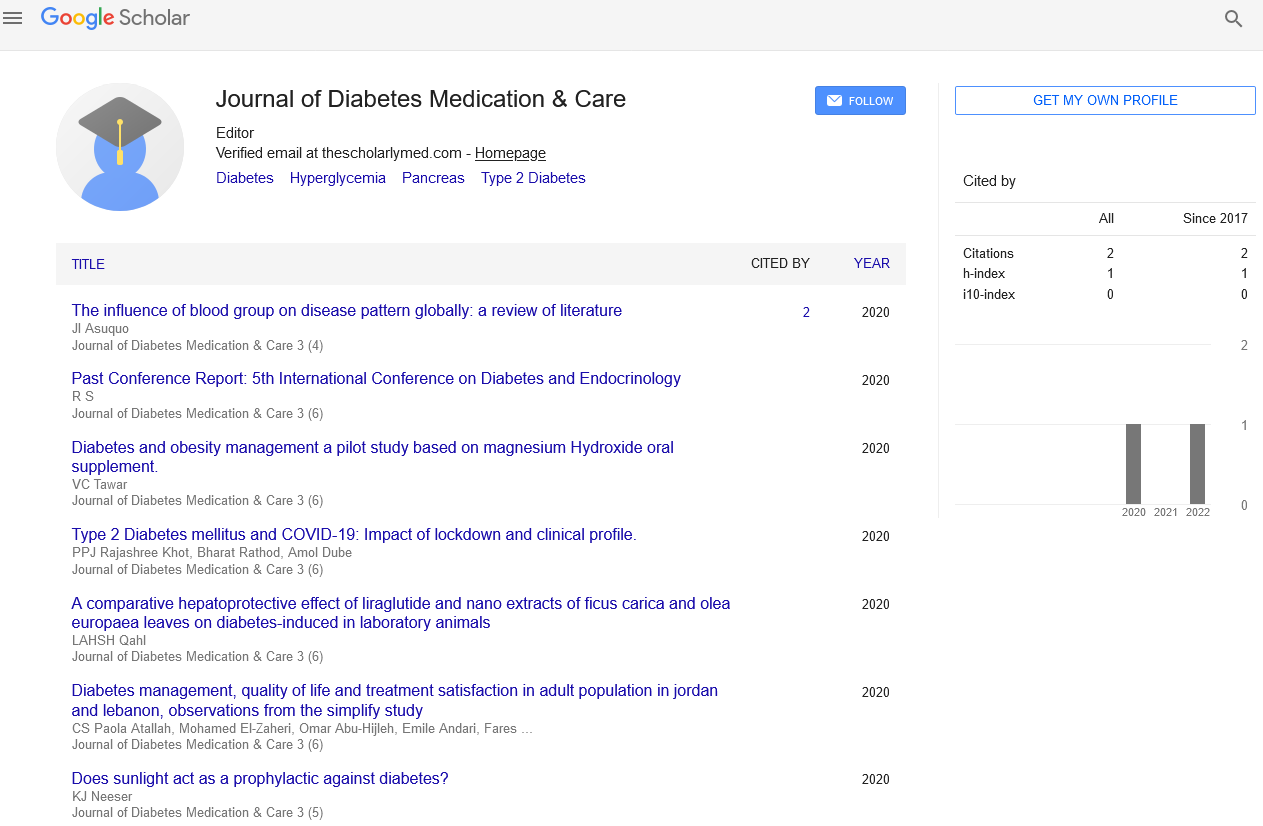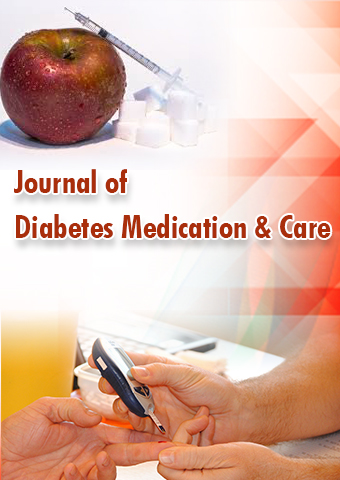Perspective - Journal of Diabetes Medication & Care (2023) Volume 6, Issue 6
Revolutionizing Diabetes Management: A Paradigm Shift in Healthcare
- Corresponding Author:
- Jeet Lexab
Department of Endocrinology, University of Desmochados, Nanawa, Paraguay
E-mail: Jelax@gmail.com
Received: 06-Nov-2023, Manuscript No. jdmc-23-122611; Editor assigned: 09-Sep-2023, PreQC No. jdmc-23-122611 (PQ); Reviewed: 23-Nov-2023, QC No. jdmc-23-122611; Revised: 11-Dec-2023, Manuscript No. jdmc-23-122611 (R); Published: 18-Dec-2023, DOI: 10.37532/jdmc.2023.6(6).156-157
Introduction
Diabetes, a chronic condition affecting millions worldwide, has long been a challenge for both patients and healthcare providers. However, with advancements in technology and innovative approaches to healthcare, there’s a paradigm shift underway in the management of diabetes. From wearable devices to artificial intelligence, the landscape of diabetes care is evolving rapidly, promising a more personalized and efficient approach to treatment.
Description
Wearable technology: Empowering patients
One of the most significant strides in diabetes management comes from the integration of wearable technology. Continuous Glucose Monitoring (CGM) devices have gained popularity, providing real-time data on blood glucose levels. These small sensors, often worn on the skin, allow patients to monitor their glucose levels throughout the day, offering a more comprehensive understanding of their condition.
Cardiovascular complications
Moreover, these devices can be synchronized with smartphones or other smart devices, enabling patients and healthcare providers to track trends and make informed decisions about diet, exercise, and insulin dosage. This empowerment of patients in self-monitoring contributes to better glycemic control and reduces the risk of complications.
Artificial intelligence: Personalized treatment plans
Artificial Intelligence (AI) is playing a pivotal role in revolutionizing diabetes management. Machine learning algorithms analyze vast datasets, incorporating information about the patient’s lifestyle, diet, activity levels, and glucose patterns. This analysis enables the creation of personalized treatment plans that cater to the unique needs of each individual.
AI-powered systems can predict blood sugar fluctuations, helping patients proactively manage their condition. This proactive approach not only improves the quality of life for individuals with diabetes but also reduces the burden on healthcare systems by minimizing emergency interventions and hospitalizations.
Telemedicine: Breaking barriers in accessibility
The rise of telemedicine has been accelerated by the need for remote healthcare access, especially during the global pandemic. For individuals with diabetes, this shift to virtual healthcare has proven to be a game-changer. Telemedicine facilitates remote consultations with healthcare professionals, allowing patients to receive timely advice, review treatment plans, and discuss concerns without the need for physical visits.
This not only enhances accessibility, especially for those in rural or underserved areas but also encourages regular check-ins and follow-ups. With the aid of video consultations and remote monitoring devices, healthcare providers can closely track patients’ progress and make necessary adjustments to their diabetes management plans.
Precision medicine: Tailoring treatment to individuals
The concept of precision medicine has gained momentum in recent years, and diabetes management is no exception. Rather than applying a one-size-fits-all approach, precision medicine tailors treatments based on an individual’s genetic makeup, lifestyle, and environmental factors.
Genetic testing allows healthcare professionals to identify specific genetic markers associated with diabetes and its complications. This information empowers clinicians to prescribe medications that are more likely to be effective for a particular patient, reducing the trial-and-error aspect of diabetes treatment.
Gamification of healthcare: Making management engaging: To enhance patient engagement and adherence to treatment plans, healthcare providers are turning to gamification. Gamified applications and devices introduce an element of fun and reward into the routine tasks of diabetes management, such as monitoring blood sugar levels, adhering to medication schedules, and maintaining a healthy lifestyle.
By transforming these activities into challenges and achievements, patients are more likely to stay motivated and actively participate in their care. This approach not only fosters a sense of accomplishment but also helps in building long-term habits that contribute to better diabetes management.
Biotechnology innovations: Advancements in insulin delivery
The field of biotechnology has witnessed groundbreaking innovations in insulin delivery systems. Smart insulin pens and pumps offer precise and programmable insulin dosages, reducing the margin of error in administration. Some devices even provide automated insulin delivery based on real-time glucose readings, mimicking the function of a healthy pancreas.
These advancements not only enhance the accuracy and convenience of insulin delivery but also contribute to better glycemic control, reducing the risk of hypoglycemia and hyperglycemia.
Patient education and support: A holistic approach
Beyond technological innovations, a holistic approach to diabetes management emphasizes the importance of patient education and support. Empowering individuals with the knowledge to understand their condition, manage their lifestyle, and make informed decisions is crucial.
Community support networks, both online and offline, play a significant role in helping individuals cope with the psychological and emotional aspects of living with diabetes. Educational programs and resources provide patients with the tools they need to navigate the challenges of diabetes, fostering a proactive and informed approach to self-care
Conclusion
The landscape of diabetes management is undergoing a revolutionary transformation, driven by technological advancements, personalized medicine, and a holistic approach to patient care. The integration of wearable technology, artificial intelligence, telemedicine, precision medicine, gamification, biotechnology, and patient education is ushering in a new era where diabetes is not just managed but proactively controlled, improving the quality of life for millions around the globe.
As we continue to embrace these innovations, it is crucial to ensure equitable access to these technologies and approaches, addressing the diverse needs of individuals with diabetes. The future of diabetes management is bright, promising a more personalized, efficient, and empowering journey for those living with this chronic condition.

